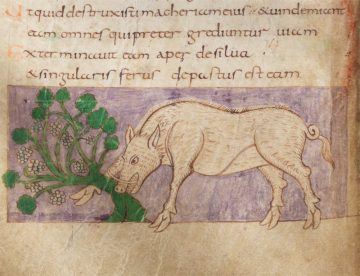Jamie Kreiner at Lapham’s Quarterly:
 These are ancient texts, but the pig’s characterization as a ravenous and dirty animal has transcended particular historical moments. Christians in early medieval Europe made the same associations, and so do we. More than one historian has pointed this out over the years, partly with the goal of rehabilitating the animals’ reputation. But this flat stereotype, this singular beast, was not the only profile a pig could have, even in the past: “premodern” views were subtler than the shorthand symbolism suggests. In late antiquity and the early Middle Ages, farmers, policy makers, and philosophers were perfectly capable of holding multiple views of pigs simultaneously, of playing into a familiar caricature but also of honing in on the complexities of the species. They saw that pigs were not merely commodities that provided humans with meat or symbols that worked as handy metaphors. They were also creatures that were capable of adapting to and altering their environments, including the human environments that only partially constrained them. Pigs were difficult to fully domesticate, both physically and conceptually. They called attention to themselves and required some engagement with their complex lives.
These are ancient texts, but the pig’s characterization as a ravenous and dirty animal has transcended particular historical moments. Christians in early medieval Europe made the same associations, and so do we. More than one historian has pointed this out over the years, partly with the goal of rehabilitating the animals’ reputation. But this flat stereotype, this singular beast, was not the only profile a pig could have, even in the past: “premodern” views were subtler than the shorthand symbolism suggests. In late antiquity and the early Middle Ages, farmers, policy makers, and philosophers were perfectly capable of holding multiple views of pigs simultaneously, of playing into a familiar caricature but also of honing in on the complexities of the species. They saw that pigs were not merely commodities that provided humans with meat or symbols that worked as handy metaphors. They were also creatures that were capable of adapting to and altering their environments, including the human environments that only partially constrained them. Pigs were difficult to fully domesticate, both physically and conceptually. They called attention to themselves and required some engagement with their complex lives.
more here.
